The Euro has had a tremendous run from early July rising from 1.28 to the current level of 1.33. The currency has been boosted by better recovery prospects. European equities have recovered as the region ended its 18 month recession in the second quarter posting growth of 0.3 per cent.
There have been encouraging economic indicators with better than expected GDP and PMI figures in recent weeks –in August, Germany was 53.5 but France, Greece, Italy and Spain were below 50 (which means contraction). One area of major concern still remains – unemployment above 50% amongst 18-30 year olds in Greece, Portugal and Spain shows very little sign of improving in the near-term. The overall job rate is more than 25% in Greece and Spain. This obviously does not bode well for the young of these countries with no job prospects and plenty of time on their hands. Unemployment will start to fall but in the meantime civil unrest concerns remain.
The political situation in the Eurozone remains precarious with former Italian Prime Minister Berlusconi threatening to bring down the Italian government if the senate decide to ban him from parliament. The upcoming general elections in Germany on 22nd September remain uncertain. Greece remains on tenterhooks and Italy’s domestic economy is still very weak with public debt second only to Greece as a percentage of GDP. The peripheral countries – Greece, Portugal and Spain will remain in recession for some time with the powerhouses France and Germany only making headway.
The Euro has been remarkably strong recently with a little too much over confidence –the Euro at the current level of 1.33 seems over exuberant. There are many possible issues that could de-rail the economy over the coming weeks.
Further reading: EUR/GBP outlook remains bearish as the Euro-zone’s recovery is still weak
